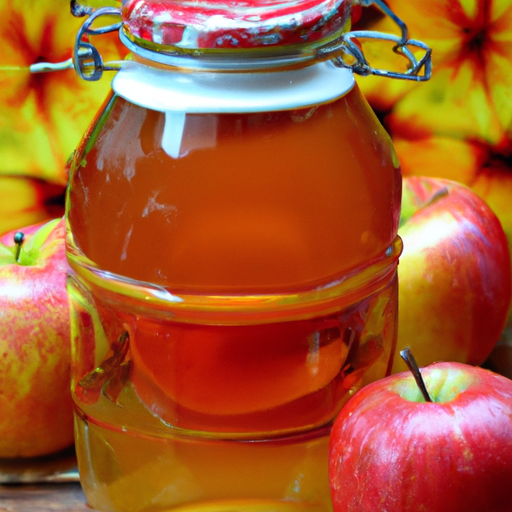Imagine a world where chickens have perfectly balanced digestive systems, leading to optimal health and productivity. Well, believe it or not, there is a simple solution that can help achieve just that – apple cider vinegar. This humble pantry staple has long been praised for its numerous health benefits, and it turns out that it can work wonders for the digestive health of our feathered friends as well. In this article, we will explore the fascinating ways in which apple cider vinegar can be incorporated into a chicken’s diet to promote a happy and healthy digestive system. So, get ready to discover the secrets behind this natural and cost-effective solution that could revolutionize the way you care for your chickens.
The Benefits of Apple Cider Vinegar for Digestive Health
Apple cider vinegar has long been hailed for its numerous health benefits, and it is no different when it comes to promoting digestive health in chickens. The acidic nature of apple cider vinegar helps in maintaining a healthy pH level in the digestive tract, which is crucial for optimal digestion. Additionally, apple cider vinegar contains beneficial bacteria and enzymes that aid in breaking down food and promoting the absorption of nutrients.
The Role of Apple Cider Vinegar in Chicken Digestion
By introducing apple cider vinegar into a chicken’s diet, you can support their digestive system in several ways. Firstly, the acidity of apple cider vinegar helps in breaking down food particles, making it easier for the chickens’ digestive enzymes to work efficiently. This can reduce the risk of digestive issues such as bloating, gas, and diarrhea. Secondly, apple cider vinegar helps to optimize the pH balance in the gut, creating an environment that promotes the growth of healthy bacteria and inhibits the growth of harmful bacteria. This balance is essential for maintaining a healthy digestive system in chickens.
Improving Gut Health in Chickens with Apple Cider Vinegar
The gut health of chickens plays a crucial role in their overall well-being. A healthy gut is essential for proper digestion, nutrient absorption, and a robust immune system. Apple cider vinegar can help improve gut health in chickens by promoting the growth of beneficial bacteria. These bacteria, known as probiotics, help maintain a healthy microbial balance in the gut, preventing the overgrowth of harmful bacteria. By incorporating apple cider vinegar into their diet, you can create an environment in the gut that supports optimal digestion and overall digestive health in chickens.
How to Use Apple Cider Vinegar for Digestive Health in Chickens
When it comes to using apple cider vinegar to promote digestive health in chickens, there are a few important factors to consider. The type of apple cider vinegar and the dosage are critical elements in ensuring its effectiveness and safety for your feathered friends.
Choosing the Right Type of Apple Cider Vinegar
Not all apple cider vinegars are created equal, so it is crucial to choose the right type for your chickens. Look for organic, raw, unfiltered apple cider vinegar, as it contains the “mother,” a colony of beneficial bacteria and enzymes that aids in digestion. Avoid distilled or pasteurized apple cider vinegar, as these processes eliminate the beneficial compounds. Opting for high-quality apple cider vinegar will ensure that your chickens receive the maximum benefits for their digestive health.
Dosage Recommendations for Chickens
When determining the dosage of apple cider vinegar for your chickens, it is important to start with small amounts and gradually increase it over time. Begin by adding 1-2 tablespoons of apple cider vinegar to a gallon of drinking water. Monitor your chickens’ response and gradually increase the dosage up to a maximum of 5 tablespoons per gallon of water. It is important to note that every chicken is unique, and it is wise to consult with a veterinarian to determine the best dosage for your specific flock.
Methods of Administering Apple Cider Vinegar to Chickens
Now that you have selected the right apple cider vinegar and determined the appropriate dosage, it is time to explore different methods of administering it to your chickens. There are two main ways to incorporate apple cider vinegar into their routine: adding it to drinking water or incorporating it into their feed.
Adding Apple Cider Vinegar to Drinking Water
One of the simplest ways to introduce apple cider vinegar to your chickens is by adding it to their drinking water. Remember the recommended dosage and adjust accordingly based on the amount of water your chickens consume. It is important to provide fresh water daily and ensure that the water container is clean to avoid contamination.
Incorporating Apple Cider Vinegar in Chicken Feed
Another method is to incorporate apple cider vinegar directly into the chicken feed. This can be done by mixing the recommended dosage of apple cider vinegar with their feed, allowing it to fully soak in before providing it to the chickens. This method ensures that every chicken gets their dose of apple cider vinegar, even if they prefer not to drink from the water container. Additionally, it can also act as a natural preservative for the feed, extending its shelf life.
Potential Side Effects and Precautions
While apple cider vinegar has numerous benefits for chicken digestion, it is important to be aware of potential side effects and take necessary precautions.
Monitoring Chickens for Adverse Reactions
As with any dietary change, it is essential to monitor your chickens for any adverse reactions or signs of discomfort. While rare, some chickens may experience digestive upset or an allergic reaction to apple cider vinegar. Such symptoms may include diarrhea, decreased appetite, or changes in behavior. If you notice any of these signs, discontinue the use of apple cider vinegar and consult a veterinarian for further guidance.
Consulting a Veterinarian for Advice
When it comes to the health of your chickens, it is always best to seek professional advice. Before introducing apple cider vinegar or making any dietary changes, consult a veterinarian who specializes in poultry health. They will be able to provide specific recommendations based on your chickens’ individual needs, ensuring their digestive health is properly supported.
Conclusion
Promoting digestive health is essential for the overall well-being of chickens, and apple cider vinegar can play a significant role in achieving this. By choosing the right type of apple cider vinegar, following proper dosage recommendations, and utilizing suitable methods of administration, you can help optimize your chickens’ digestive system. Always monitor your chickens for any adverse reactions and consult a veterinarian for personalized advice. With the benefits of apple cider vinegar, you can support your feathered friends in maintaining a healthy digestive system and better overall health.




